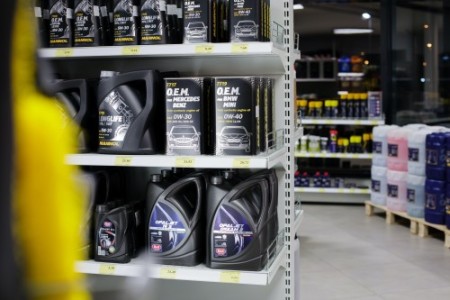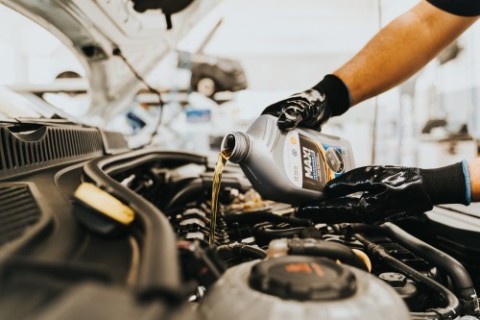To ensure optimum performance and lifespan, your automobile’s gearbox system must be properly maintained and cared for. Choosing the proper gearbox fluid for your unique gearbox model is a critical component of this maintenance. Understanding the proper gearbox fluid type is essential to maintaining the efficiency and dependability of the 4R100 gearbox, a crucial part of many Ford cars. This overview explores the importance of selecting the proper gearbox fluid for the 4R100 gearbox and offers information on the different fluid choices, enabling you to make well-informed selections to maintain your car in good working order.
Recommended Fluid Types:
The 4R100 transmission’s recommended fluid types are crucial to preserving its functionality, durability, and general health. Under various driving circumstances, the correct operation of the gearbox is influenced by these fluid types. There are a few possibilities, but it is important to choose the fluid type that matches the demands of your driving style and your car.
Dexron/Mercon ATF (Automatic Transmission Fluid):
A common gearbox fluid that works with numerous cars that use the 4R100 gearbox is called Dexron III/Mercon ATF. This kind of fluid offers the vital lubrication, cooling, and hydraulic qualities required for effortless gear changes and top gearbox performance. It is appropriate for daily commuting and common driving situations and is built to resist average driving conditions. Automotive supply stores sell Dexron/Mercon ATF, which is a dependable option for keeping your gearbox in working order.
Synthetic ATF (Automatic Transmission Fluid):
In comparison to conventional fluids, synthetic ATF delivers a greater degree of performance and durability. This fluid type, which was developed using innovative additives and a synthetic basis, demonstrates remarkable resistance to heat, oxidation, and viscosity breakdown. Synthetic ATF is a smart choice for cars that suffer heavy-duty operation, such as towing, hauling, or operating in extremely hot or freezing weather since it can extend fluid life. Although synthetic ATF is frequently more expensive, its advantages in terms of extended fluid life and improved protection for your 4R100 gearbox can make up for the higher initial cost.
Types of Transmission Fluid for 4R100
Mercon V:
- Characteristics and Benefits:
- Ford-specific conventional gearbox fluid of the highest caliber.
- Outstanding lubrication and wear resistance qualities.
- Enhanced friction durability for smooth shifting.
- Suitable for a wide range of operating temperatures.
Synthetic ATF:
With improved protection and performance for automatic transmissions, particularly those with the 4R100 gearbox, synthetic automatic transmission fluid (ATF) is a significant improvement in lubricant technology. Specialized additives and synthetic base oils are used to create synthetic ATF, which has many advantages over regular ATF.
- High-Temperature Stability: The exceptional thermal stability of synthetic ATF allows it to resist hot temperatures without degrading or losing viscosity. This is crucial for gearboxes that work under demanding conditions like towing or stop-and-go traffic.
- Improved Cold-Weather Performance: Low-temperature synthetic ATF flows more effectively, resulting in smoother shifts and less wear during cold starts. This trait improves overall transmission responsiveness, especially at subfreezing temperatures.
- Enhanced Oxidation Resistance: Because synthetic ATF is less likely to oxidize, its qualities will last longer. As a result, the fluid’s lifespan is prolonged and the chance of varnish or sludge forming inside the gearbox is decreased.
- Reduced Friction and Wear: Modern synthetic ATF formulations reduce wear and enhance overall gearbox efficiency by reducing friction between moving elements. This could result in a gearbox that lasts longer.

Importance of Regular Fluid Changes:
The health and lifespan of your vehicle’s gearbox, especially the 4R100 gearbox, depend heavily on routine fluid changes. For the gearbox system to operate properly, the gearbox fluid acts as a key lubricant and hydraulic medium. Here’s why routine fluid replacements are so important:
- Lubrication and Heat Dissipation: Transmission fluid lubricates the different portions of the transmission, minimizing wear and strain on moving elements and decreasing friction. Additionally, it aids in the removal of heat produced during operation, avoiding overheating and potential damage.
- Contaminant Removal: Transmission fluid can gather impurities, metal fragments, and debris over time due to regular wear and tear. By removing these impurities via routine fluid changes, you can stop them from recirculating and harming the gearbox.
- Preventing Sludge and Varnish: The oxidation and heat exposure of gearbox fluid can cause it to degrade and produce sludge or varnish. The creation of these hazardous deposits is prevented by using fresh fluid, which helps to maintain correct viscosity.
- Optimal Shifting and Performance: Smooth and accurate gear shifts are made possible by clean, properly functioning transmission fluid, which enhances the driving experience. Neglected fluid might result in slow shifts, difficult engagement, and mediocre performance in general.
- Prolonged Transmission Life: Your transmission’s lifespan may be increased with appropriate maintenance, such as routine fluid changes. Premature wear and mechanical breakdowns are less likely when using a new fluid with suitable viscosity and characteristics.
Steps for Changing Fluid Transmission:
For a 4R100 gearbox to receive a good and efficient fluid change, numerous actions must be taken. Please be aware that these instructions are only designed to serve as a basic reference, and that you should always consult the individual service handbook for your car for precise directions. Before beginning, make sure you have the required tools, equipment, and replacement fluid. It is advised to seek the assistance of a qualified technician if you do not feel confident carrying out these actions.
Gather Supplies and Tools:
- fresh gearbox fluid that is suitable for your vehicle’s requirements
- Filter for gearbox fluid, if applicable
- Drain pan or vessel
- Wrenches and a socket set
- Funnel
- protective eyewear and gloves
- If necessary, a jack and jack stands.
Safety Precautions:
- Put the parking brake on when you place your car in a level parking space.
- To keep the car from driving, use wheel chocks.
- Before proceeding, let the engine cool.
Locate and Access the Transmission Pan:
- To find the gearbox pan, go to your car’s owner’s handbook.
- To collect the used fluid, place the drain pan underneath the gearbox pan.
Drain the Old Fluid:
- The gearbox pan’s bolts need to be loosened and taken out.
- Lower the pan slowly to let the used fluid go into the drain pan.
Clean the Pan and Magnet:
- To get rid of any residue or dirt, carefully clean the interior of the gearbox pan.
- To get rid of metal fragments, clean the magnet that is linked to the pan.
Replace the Filter (if applicable):
- Follow the manufacturer’s directions while installing the new gearbox filter.
- Make sure the mounting is straight and secure.
Reinstall the Pan:
- If the manufacturer of your car specifies it, install a replacement gasket.
- Place the gearbox pan back onto the gearbox with caution.
- The pan bolts should be uniformly tightened to the manufacturer’s recommended torque levels.
Refill with New Fluid:
- Under the hood, find the transmission dipstick and take it out.
- Fill the dipstick tube with a funnel.
- Add the fresh gearbox fluid gradually, using the dipstick to verify the level.

Maintenance Tips and Best Practices:
Your 4R100 gearbox needs maintenance beyond simple fluid changes. Here are some maintenance recommendations and recommended practices to assist in making sure your gearbox lasts a long time and performs as it should:
Regular Fluid Checks:
- Regularly check the level of the gearbox fluid and fill it up if required.
- Look for any stains, burning smells, or contaminants in the fluid. Clear and crimson fluid indicates good health.
Avoid Overheating:
- Transmission damage may result from overheating. Make sure the cooling system in your car is functioning properly and is not leaking.
Proper Driving Habits:
- Avoid speeding aggressively, accelerating quickly, and stopping quickly. The gearbox may be overworked because of these acts.
Warm-Up Period:
- Before you go behind the wheel, let your car a few minutes to warm up, especially in cooler weather. By doing this, the gearbox fluid can operate at its ideal temperature.
Towing and Hauling:
- Installing an additional gearbox cooler is an innovative idea if you routinely haul big loads or tow trailers. This assists in maintaining the safe temperature of the gearbox fluid.
Use the Right Gear:
- Utilize the right equipment for your driving circumstances. For instance, to reduce the amount of stress on the gearbox when descending steep hills, utilize lower gears.
Address Problems Promptly:
- Have your car checked out as soon as you hear any strange noises, notice any slippage, delayed shifting, or other transmission-related problems.
Regular Service Inspections:
- Include gearbox inspections in your regular maintenance schedule for your car. Have the gearbox checked by a skilled mechanic for wear, leaks, and other problems.
Frequently Asked Questions (FAQs):
What sort of oil is suitable for a 4R100?
Dexron III/Mercon ATF or comparable automated gearbox fluids work with the 4R100 gearbox. You may also use synthetic ATF to improve performance, but for precise instructions, always consult your vehicle’s owner’s handbook.
How much gearbox fluid can a 4R100 hold?
Including the fluid in the torque converter, the 4R100 gearbox can normally carry about 17 to 19 quarts (about 16 to 18 liters) of gearbox fluid.
What is the purpose of the 4R100 gearbox?
The 4R100 gearbox is an automated gearbox used in cars to change ratios smoothly and automatically while effectively transferring power from the engine to the wheels. Its goals include improving the performance of the vehicle, offering different torque ratios, and enabling smooth acceleration and deceleration while responding to road circumstances.
What quantity of gearbox fluid is ideal?
The ideal quantity of gearbox fluid for a 4R100 transmission is typically around 17 to 19 quarts (16 to 18 liters), including what is in the torque converter.
Conclusion:
In conclusion, keeping your 4R100 gearbox in undamaged shape and operating at peak efficiency is crucial for ensuring that your car performs at its best. Regular maintenance should be prioritized since the transmission’s function in power transfer is essential to a comfortable driving experience. You may actively contribute to the durability and dependability of your gearbox by carefully following the directions provided for changing the gearbox fluid and according to maintenance advice and best practices. This proactive method assists in maintaining correct lubrication, avoiding excessive wear, and spotting problems before they become serious. Maintaining these maintenance schedules can help you avoid future expensive repairs while also ensuring the continuing efficiency of your car.

